Navigation
"The ‘Guardians of Wildlife...Wild is Beautiful’ project of "Pracownia na rzecz wszystkich istot" — "Workshop for All Beings"
"The ‘Guardians of Wildlife...Wild is Beautiful’ project of "Pracownia na rzecz wszystkich istot" — "Workshop for All Beings"-— seeks to protect the environment of Poland by helping local communities become knowledgeable about their local environment and enabling them to better articulate the conservation issue they need to pursue.
Location:
Wapienica Valley, close to Bielsko-Biala, Bialowieza Primeval Forest, Mount St.Anna Park, Turnicki National Park, Pszczyna Forests, Karkonosze Mountains, other communities, Poland
Problem Overview:
Destruction of Poland's forests due to irresponsible logging and lack of governmental commitment
"Poland’s new constitution provides mechanisms for resource management policies, but few Poles know what they are or how to use them. Poland’s forests and wildlife are victims of almost a century of shortsighted natural resource management. Sadly, as of 1996 the government and most of the country’s citizens, except for a cadre of environmental activists, remained generally unconcerned about ecological consequences of their actions. Short-term interests, including economic returns of logging and irresponsible hunting, dominated. And, although fifteen percent of Poland was covered by forest, only one-half of one percent was officially protected."
"Furthermore, the Ministry of Ecology, the government body responsible for overseeing Poland’s forests and wildlife, was dominated by logging and industrial interests. Those industries skillfully lobbied for and won the support of many of the Ministry’s bureaucrats. The logging interests were able to use this influence to win an increasing number of concessions from the Ministry, thus increasing the number of trees that are being harvested in Poland’s national forests."
"Janusz Korbel, President and a Founder of the "Workshop for All Beings" expresses the problem as resulting from a shortsighted view held by many people in Poland of the nation’s forests, wetlands and wildlife being natural resources without limit. There is also a lack of community involvement working for the protection of nature. Furthermore, while the term "ecology" is popular in Poland, ecological awareness and knowledge is very low. ‘Poland is still one of the few European countries where wildlife is a meaningful part of the country’s ecosystems. However, at the same time, wildlife in Poland is seriously threatened by irresponsible management.’ "
This case study is provided by Korbel, an Ashoka Fellow and Ashoka: Innovators for the Public, a non-profit international organization supporting social entrepreneurs from developing countries who have innovative plans for positive social change. The text in quotes is from Ashoka.
"The ‘Guardians of Wildlife...Wild is Beautiful’ project of "Pracownia na rzecz wszystkich istot" — "Workshop for All Beings"-— seeks to protect the environment of Poland by helping local communities become knowledgeable about their local environment and enabling them to better articulate the conservation issue they need to pursue. It is building a broad citizen-based environmental movement and equipping citizens to form and sustain a commitment to Poland’s primeval forests and wildlife and to the ecology of its many human communities, as development takes place in the recent political and economic contexts. They prepare maps of "Wild Poland" and of existing and possible problems and conflicts. To help provide a social background for these efforts, they find and gather local people to participate in training programs. The seminars and workshops inform them about Poland's environmental laws, ways of social, political and scientific cooperation and participation, and ways of creating groups of lobbyist. They publish a monthly illustrated magazine "Wild Nature," which is widely quoted in the national media."
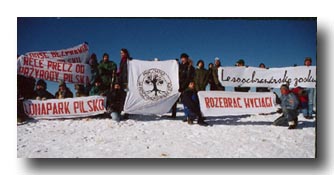 |
Since 1997, the "Workshop for All Beings " is a member of International Wolf Federation and the Polish branch of the Native Forest Network.
"The ‘Guardians of Wildlife...Wild is Beautiful’ project was started in 1992 by Janusz Korbel, a founder of the Workshop for All Beings. He is an architect who specializes in adapting architecture to its natural surroundings. He wrote a book, Life Architecture, that outlines his views on positive, human-environmental interface through architecture. It was through this interest in environmental architecture that he became more widely interested in the environmental movement in Poland. "
"The Workshop for All Beings (formerly known as The Studio for Living Architecture) is an association created in 1990 on the basis of the "Deep Ecology" movement and perceptions of the world as indivisible — encompassing a unity of humans and nature. In 1986, a small group of people signed first principles accepted by the movement. After 6 years of workshops, lectures, and campaigns, we decided to start a new project to establish a network of engaged people — the Guardians — trained to be the local leaders and the members of an effective network working for the preservation of nature. The project virtually started by itself: there was a need to coordinate our efforts and to create a map for our activities. I suggested that this map should be a map of wild Poland, prepared by the Guardians. Publishing of a map of "Wild Poland" and the places of conflicts provides clear bases for protection efforts and engenders nationwide support for local Guardians."
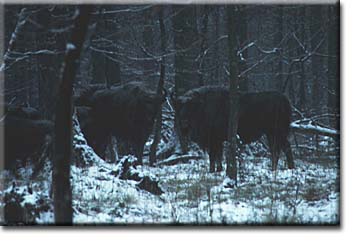 |
We believed that to protect wildlife in Poland we needed to describe a map of ecological "grates" — structure and links — and to establish a network of Guardians who, in cooperation with local communities, would guard the natural areas and environmentally oriented scientists. At the end of a training program, the participants would receive a license designating them Guardians of wildlife. They would become part of a network working together to resolve problems, sometimes supporting major country- wide campaigns by organizing meetings and press conferences with local people, sending petitions, and gathering local activists and supporters together. This is what we now have underway.
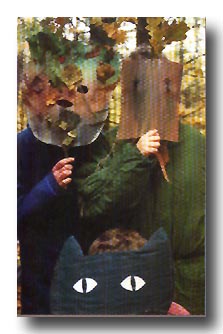 |
We have a small center in Wapienica Valley, close to Bielsko-Biala, where 3 people work as the officers (with symbolical salaries) and about 20 support as the volunteers. The center works thanks to support by the city council of Bielsko-Biala and donations from common people. The center is a base for workshops and an office. Ninety percent of the work is done free of charge because we want to remain independent of governmental influence and there is a lack of tradition of sponsoring of environmental movement in Poland.
"The Guardians of Wildlife provide a series of seminars that inform people about Poland’s environmental laws and help them learn key processes such as how to prepare and present environmental assessment studies, how to resolve environment-related conflicts and how to think creatively about eco-friendly development possibilities. They stimulate concern for environmental issues and political participation through the use of the media. Through their training programs, people develop skills for public discussion and exploration of alternatives that will not only help Polish communities address the environmental implications of an industrial plant, for example, but will also equip the citizens of the new democracy with tools for more general use. Janusz believes that it is critical to educate people in a new democratic system about activism and community involvement to ensure healthy political development: ‘ educating them about the processes they need to understand to effectively influence policy decisions about their environmental issues.’ The Project also works at a broad level to inform the public about the work of environmentalists and to heighten their effectiveness by bringing them together."
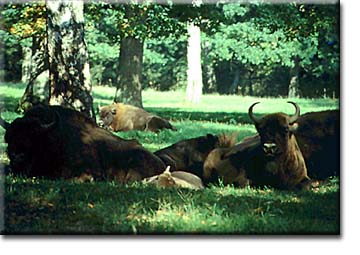 |
"The participants take part in a series of workshops such as workshops on nature, on working with the media, on campaigning, and special, 7-to-10 day, workshops that concentrate on problem areas. The participants work for the region, meet with local citizens, administration officials, biologists, and foresters.".
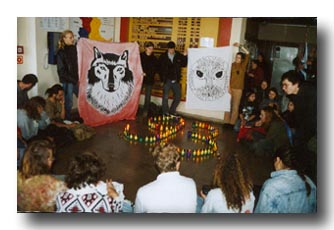 |
"Through local media coverage and participation in meetings, the Guardians inform people about problems. The workshops and meetings organized by our center give an opportunity for Guardians to share ideas, experiences, and different approaches to problems. More and more local people become the members of the ecological movement and activists who have basic ecological knowledge and political skills. I believe that only prepared, local groups, known and accepted by their community can start the process of deepening of ecological awareness."
"The Guardians of Wildlife works with the media by providing them information about local problems and giving examples of personal engagements and the benefits of protecting nature."
The "Workshop for All Beings" project is rooted as the most popular and chosen in 1997 as "the best Polish environmental organization’ ecological organization."
- The project is still expanding. At the end of 1998, Guardians of Wildlife plans to give the first licenses for people who have participated in it since 1996.
Target audience:
Humans and nature are one and interconnected, so both sides are benefiting. Locally, people benefit from eco-touring, support for endangered regions, and from growing popularity of their natural treasures, some of which they were formerly unaware. However, the process takes a long time.
Follow-up:
- There is limited ecological awareness, especially among farmers, combined with strong pressure from people with short-term interests such as that of loggers. Some developers misinform local people that protection of nature will cause only financial loss.
- The participants of the project established about 10 formal and informal affiliate groups all around Poland. Each month they receive the"Wild Nature" journal and an information newsletter. From time to time they receive an invitation for Guardians meeting, questions, or special materials (like Guardian's Vademecum). Affiliate groups develop their local projects.
- Many Guardians developed local projects in which they articulated local environmental needs and formed the action plans.
Some examples include:
- Bialowieza Primeval Forest for "Forest Freedom" in the middle of Poland;
- a project "Mountains for Nature";
- "Threatens of Karkonosze Mountains";
- action for Turnicki National Park;
- network for protection of the Wolf;
- and a project of introduction of predators etc.
A guardian who is a leader of campaign for establishing of ecological park in the forest "Wolnosc" (Freedom), prepared and published a description of the idea and a biological evaluation of the region. He then organized a group of activists and the workshops.
A guardian who started a campaign for establishing of landscape park of Pszczyna Forests a year ago, organizes local festivals and rituals on the basis of local traditions, publishes leaflets, and invites famous people who help generate support.
Another guardian prepared an independent report on the situation in one national park and the surrounding area. He also organized a press conference and stimulated a group of local people to act for nature.
A group of Guardians started a campaign "Mountains for Nature." They described the conflicts between nature preservation and ski projects. They printed post cards, organized public meetings, and activities which received wide national television coverage.
Some actions are supported by all Guardians.
Some aspects of The Guardians of Wildlife project are use in the Slovakian project, Gaja. The Guardians also benefit from their ideas. Both sides participate in workshops in Poland and Slovakia.
Partially thanks to the Guardians’ campaign, the wolf is now protected in Poland (since February 1998).
Many problems of bad management of mountain areas were widely shown on national TV (April 1998) thanks to the work of the Guardians and some new projects were stopped.
The Guardians best known present Polish campaign for protection of the landscape is park Mount St.Anna against potentially damaging highway construction. The campaign involved a 10 day workshop for the Guardians and took place in January. It focused many scientists, actors, politicians, and musicians on the problem, and forced the local government to reconsider the consequences the projected highway routes would have on these ecologically valuable areas.
Polish Ministry for Environmental Protection promised to establish Turnicki National Park, after a year long local and regional Guardians campaign with workshops, meetings etc.
Polish Minister has started to cooperate with the Guardians project and has participated in meetings with local people in the most important areas.
The Guardians of Wildlife plans to widen the map of Wild Poland according to new information provided by Guardians and other interested people throughout the country.
The Guardians are working on maps of their "bioregions." They describe the most precious natural areas and existing and probable conflicts.
The Guardians of Wildlife also cooperates with a similar project in Slovakia led by another Ashoka Fellow, Juraj Lukac.
- There is inadequate knowledge about the problem among people in urban areas, even among those who believe themselves to be ecologically oriented.
Documentation:
The Guardians of Wildlife publishes a monthly, illustrated magazine, "Wild Nature" with a circulation of 1500 copies. It is sent to the Guardians, to politicians, environmental groups, and nature centers. The magazine is widely quoted in the national media and helps popularize the idea of "Wild Poland." Because of this, local people feel inspired and initiate similar activities.
The first draft of the map of "Wild Poland" was published in June in the biggest Polish newspaper's magazine "Rzeczpospolita" (5 pages with photographs from some important regions).
Submitted by:
Ashoka, Innovators for the Public
Changemakers site: http://www.changemakers.net/
Andrzej "Janusz" Korbel, Ashoka Fellow
"Workshop for All Beings"
ul. Modrzewskiego 29/3
43-300 Bielsko-Biala, Poland
tel/fax: +48 33 110871
e-mail: janusz@pnrwi.most.org.pl
- Login to post comments

Search
Latest articles
Agriculture
- World Water Week: Healthy ecosystems essential to human health: from coronavirus to malnutrition Online session Wednesday 24 August 17:00-18:20
- World Water Week: Healthy ecosystems essential to human health: from coronavirus to malnutrition Online session Wednesday 24 August 17:00-18:20
Air Pollution
- "Water and Sanitation-Related Diseases and the Changing Environment: Challenges, Interventions, and Preventive Measures" Volume 2 Is Now Available
- Global Innovation Exchange Co-Created by Horizon International, USAID, Bill and Melinda Gates Foundation and Others
Biodiversity
- It is time for international mobilization against climate change
- World Water Week: Healthy ecosystems essential to human health: from coronavirus to malnutrition Online session Wednesday 24 August 17:00-18:20
Desertification
- World Water Week: Healthy ecosystems essential to human health: from coronavirus to malnutrition Online session Wednesday 24 August 17:00-18:20
- UN Food Systems Summit Receives Over 1,200 Ideas to Help Meet Sustainable Development Goals
Endangered Species
- Mangrove Action Project Collaborates to Restore and Preserve Mangrove Ecosystems
- Coral Research in Palau offers a “Glimmer of Hope”
Energy
- Global Innovation Exchange Co-Created by Horizon International, USAID, Bill and Melinda Gates Foundation and Others
- Wildlife Preservation in Southeast Nova Scotia
Exhibits
- Global Innovation Exchange Co-Created by Horizon International, USAID, Bill and Melinda Gates Foundation and Others
- Coral Reefs
Forests
- NASA Satellites Reveal Major Shifts in Global Freshwater Updated June 2020
- Global Innovation Exchange Co-Created by Horizon International, USAID, Bill and Melinda Gates Foundation and Others
Global Climate Change
- It is time for international mobilization against climate change
- It is time for international mobilization against climate change
Global Health
- World Water Week: Healthy ecosystems essential to human health: from coronavirus to malnutrition Online session Wednesday 24 August 17:00-18:20
- More than 400 schoolgirls, family and teachers rescued from Afghanistan by small coalition
Industry
- "Water and Sanitation-Related Diseases and the Changing Environment: Challenges, Interventions, and Preventive Measures" Volume 2 Is Now Available
- Global Innovation Exchange Co-Created by Horizon International, USAID, Bill and Melinda Gates Foundation and Others
Natural Disaster Relief
- STOP ATTACKS ON HEALTH CARE IN UKRAINE
- Global Innovation Exchange Co-Created by Horizon International, USAID, Bill and Melinda Gates Foundation and Others
News and Special Reports
- World Water Week: Healthy ecosystems essential to human health: from coronavirus to malnutrition Online session Wednesday 24 August 17:00-18:20
- STOP ATTACKS ON HEALTH CARE IN UKRAINE
Oceans, Coral Reefs
- World Water Week: Healthy ecosystems essential to human health: from coronavirus to malnutrition Online session Wednesday 24 August 17:00-18:20
- Mangrove Action Project Collaborates to Restore and Preserve Mangrove Ecosystems
Pollution
- Zakaria Ouedraogo of Burkina Faso Produces Film “Nzoue Fiyen: Water Not Drinkable”
- "Water and Sanitation-Related Diseases and the Changing Environment: Challenges, Interventions, and Preventive Measures" Volume 2 Is Now Available
Population
- "Water and Sanitation-Related Diseases and the Changing Environment: Challenges, Interventions, and Preventive Measures" Volume 2 Is Now Available
- "Water and Sanitation-Related Diseases and the Changing Environment: Challenges, Interventions, and Preventive Measures" Volume 2 Is Now Available
Public Health
- Honouring the visionary behind India’s sanitation revolution
- Honouring the visionary behind India’s sanitation revolution
Rivers
- World Water Week: Healthy ecosystems essential to human health: from coronavirus to malnutrition Online session Wednesday 24 August 17:00-18:20
- Mangrove Action Project Collaborates to Restore and Preserve Mangrove Ecosystems
Sanitation
- Honouring the visionary behind India’s sanitation revolution
- Honouring the visionary behind India’s sanitation revolution
Toxic Chemicals
- "Water and Sanitation-Related Diseases and the Changing Environment: Challenges, Interventions, and Preventive Measures" Volume 2 Is Now Available
- Actions to Prevent Polluted Drinking Water in the United States
Transportation
- "Water and Sanitation-Related Diseases and the Changing Environment: Challenges, Interventions, and Preventive Measures" Volume 2 Is Now Available
- Urbanization Provides Opportunities for Transition to a Green Economy, Says New Report
Waste Management
- Honouring the visionary behind India’s sanitation revolution
- Honouring the visionary behind India’s sanitation revolution
Water
- Honouring the visionary behind India’s sanitation revolution
- Honouring the visionary behind India’s sanitation revolution
Water and Sanitation
- Honouring the visionary behind India’s sanitation revolution
- Honouring the visionary behind India’s sanitation revolution

